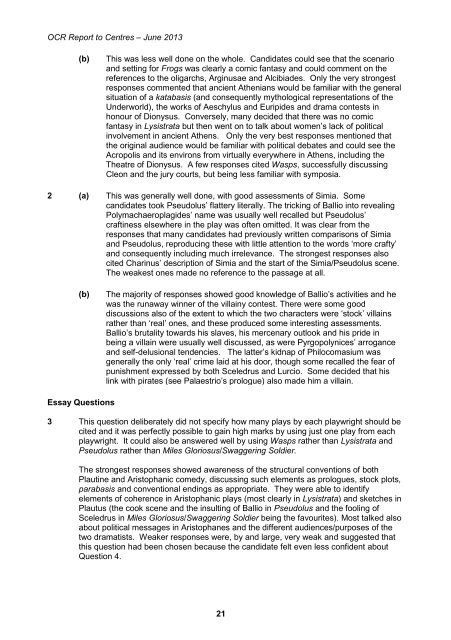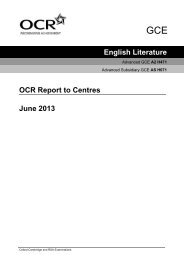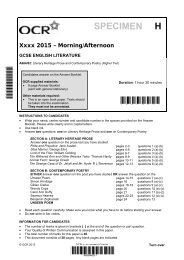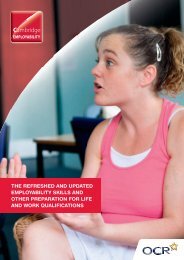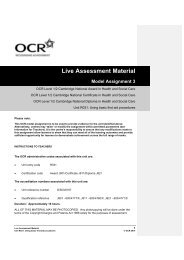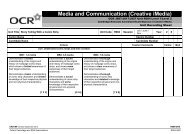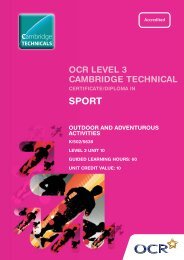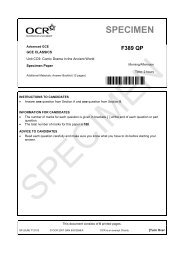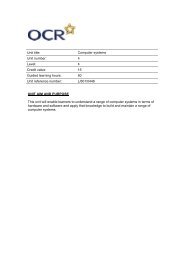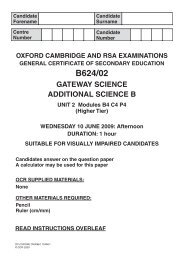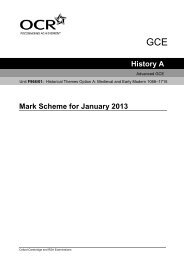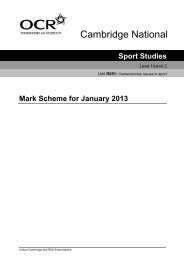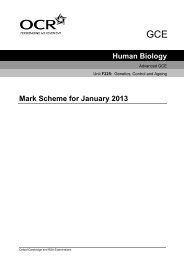Examiners' reports - June (PDF, 440KB) - OCR
Examiners' reports - June (PDF, 440KB) - OCR
Examiners' reports - June (PDF, 440KB) - OCR
Create successful ePaper yourself
Turn your PDF publications into a flip-book with our unique Google optimized e-Paper software.
<strong>OCR</strong> Report to Centres – <strong>June</strong> 2013<br />
(b)<br />
This was less well done on the whole. Candidates could see that the scenario<br />
and setting for Frogs was clearly a comic fantasy and could comment on the<br />
references to the oligarchs, Arginusae and Alcibiades. Only the very strongest<br />
responses commented that ancient Athenians would be familiar with the general<br />
situation of a katabasis (and consequently mythological representations of the<br />
Underworld), the works of Aeschylus and Euripides and drama contests in<br />
honour of Dionysus. Conversely, many decided that there was no comic<br />
fantasy in Lysistrata but then went on to talk about women’s lack of political<br />
involvement in ancient Athens. Only the very best responses mentioned that<br />
the original audience would be familiar with political debates and could see the<br />
Acropolis and its environs from virtually everywhere in Athens, including the<br />
Theatre of Dionysus. A few responses cited Wasps, successfully discussing<br />
Cleon and the jury courts, but being less familiar with symposia.<br />
2 (a) This was generally well done, with good assessments of Simia. Some<br />
candidates took Pseudolus’ flattery literally. The tricking of Ballio into revealing<br />
Polymachaeroplagides’ name was usually well recalled but Pseudolus’<br />
craftiness elsewhere in the play was often omitted. It was clear from the<br />
responses that many candidates had previously written comparisons of Simia<br />
and Pseudolus, reproducing these with little attention to the words ‘more crafty’<br />
and consequently including much irrelevance. The strongest responses also<br />
cited Charinus’ description of Simia and the start of the Simia/Pseudolus scene.<br />
The weakest ones made no reference to the passage at all.<br />
(b)<br />
The majority of responses showed good knowledge of Ballio’s activities and he<br />
was the runaway winner of the villainy contest. There were some good<br />
discussions also of the extent to which the two characters were ‘stock’ villains<br />
rather than ‘real’ ones, and these produced some interesting assessments.<br />
Ballio’s brutality towards his slaves, his mercenary outlook and his pride in<br />
being a villain were usually well discussed, as were Pyrgopolynices’ arrogance<br />
and self-delusional tendencies. The latter’s kidnap of Philocomasium was<br />
generally the only ‘real’ crime laid at his door, though some recalled the fear of<br />
punishment expressed by both Sceledrus and Lurcio. Some decided that his<br />
link with pirates (see Palaestrio’s prologue) also made him a villain.<br />
Essay Questions<br />
3 This question deliberately did not specify how many plays by each playwright should be<br />
cited and it was perfectly possible to gain high marks by using just one play from each<br />
playwright. It could also be answered well by using Wasps rather than Lysistrata and<br />
Pseudolus rather than Miles Gloriosus/Swaggering Soldier.<br />
The strongest responses showed awareness of the structural conventions of both<br />
Plautine and Aristophanic comedy, discussing such elements as prologues, stock plots,<br />
parabasis and conventional endings as appropriate. They were able to identify<br />
elements of coherence in Aristophanic plays (most clearly in Lysistrata) and sketches in<br />
Plautus (the cook scene and the insulting of Ballio in Pseudolus and the fooling of<br />
Sceledrus in Miles Gloriosus/Swaggering Soldier being the favourites). Most talked also<br />
about political messages in Aristophanes and the different audiences/purposes of the<br />
two dramatists. Weaker responses were, by and large, very weak and suggested that<br />
this question had been chosen because the candidate felt even less confident about<br />
Question 4.<br />
21


